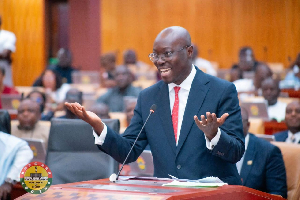Sunyani, May 6, GNA - Two eminent Brong Ahafo citizens on Friday urged parents and other stakeholders to place a high premium on quality education in the Region.
They warned that if the current poor education standard was not reversed, scholars from the region would continue to be second rate competitors on the national job market.
Professor George Benneh, former Vice-Chancellor of the University of Ghana, Legon (UGL), and Chairman of the National Population Council, and Professor Christopher Ameyaw-Akumfi, Director-General of the Ghana Education Service, were speaking on "Education in Brong Ahafo" at a symposium that coincided with the inauguration of the regional branch of Emerging Leaders for Development at Sunyani on Friday.
Prof. Benneh noted that quality education is necessary for the region's growth since it is only trained minds that can turn raw materials into wealth. The Brong Ahafo Region abounds in rich natural resources and it is only skills acquired through training that can harness and utilise the resources for the benefit of its people and the nation at large, he said.
Prof. Benneh advised those who have acquired good education not to rest on their oars but make education a life-long occupation "since what students learnt ten years ago may not be relevant to today's needs". He mentioned low school enrolment, lack of teaching materials and trained teachers and poor quality teaching as some of the major problems militating against good quality education in the region.
Prof. Benneh said out of 20,000 students in the UGL, and the Kwame Nkrumah University of Science and Technology, less than 1,000 are from the Brong Ahafo Region. He said females from the region account for less than two per cent of the students population in these institutions, adding: "the situation is clearly unsatisfactory".
With the establishment of the proposed Catholic University at Fiapre, near Sunyani, he said the future of education in the region was bright. He urged students to work hard and take advantage of the establishment of other tertiary institutions like the Sunyani Polytechnic and the University for Development Studies campus at Kintampo to upgrade their skills and knowledge.
Prof. Ameyaw-Akumfi said the people should check the tendency of placing greater premium on the acquisition of wealth at the expense of higher education and employable skills. He called on communities to get actively involved in the management of schools and give incentives to teachers to enable them to work hard.
Prof. Ameyaw-Akumfi said out of 2,123 teachers needed to teach in basic schools in the Region, only 770 are at post and called for the involvement of district assemblies, traditional council and the private sector in education.
General News of Saturday, 6 May 2000
Source: GNA












